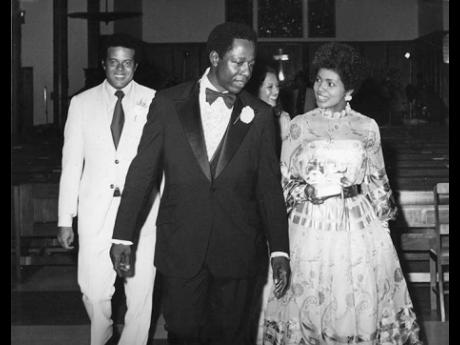Hank Aaron was a nervous wreck at Jamaican wedding, pastor recalls
Hank Aaron, the record-setting batter whose swashbuckling swings knocked Babe Ruth from the pedestal of baseball’s shrine while battling racism off the diamond, almost struck out when he faced an unfamiliar pitcher in Jamaica the year before his...
Hank Aaron, the record-setting batter whose swashbuckling swings knocked Babe Ruth from the pedestal of baseball’s shrine while battling racism off the diamond, almost struck out when he faced an unfamiliar pitcher in Jamaica the year before his history-making feat.
Six months before he toppled Babe with that ruthless strike for his 715th home run, Hammerin’ Hank was on tenterhooks before he managed to say ‘I do’ during a small wedding at The University Chapel in Mona in 1973.
That’s the recollection of the Reverend Dr Horace Russell, the local Baptist pastor who officiated the ceremony. Russell, now 91, said he didn’t have the faintest clue about Aaron’s stardom at the time but recalled being convinced by then Director of Tourism Tony Abrahams to perform the nuptials.
It was when Russell saw the wedding pictures splashed on the pages of Ebony magazine that he grasped the enormity of the occasion and the measure of the man.
“From ignorance, I got some publicity,” he quipped in reference to the “very quiet wedding” during a Gleaner interview in the wake of Aaron’s death on January 22.
STRUCK WITH FEAR
The paradox was stark as Aaron, who had become used to the flash of cameras and stadia filled with fans, was struck with fear on his wedding day.
“Here was a person who stood before crowds of thousands and he was nervous. Boy, he was nervous! I had to calm him down,” the retired cleric said.
Russell, professor emeritus of historical theology and dean of chapel, disclosed that he told Aaron that marriage was not a trifle matter and that his wife was an important lady.
That lady was Billye Suber Williams, who had divorced her first husband three years earlier and was charting pioneering paths in television as an African American talk-show host in the southeast in the era of Black Power and the civil-rights struggle. Russell isn’t surprised that the marriage of the “good, believing Baptists” lasted almost half a century, broken only by death.
“She was a big deal. He was big, too, but she was also big. It was a marriage of equals,” Russell told The Gleaner.
Aaron, 86, was buried last Wednesday.
The confluence of sporting excellence and race politics put Aaron at the centre of ideological forces that were bigger than baseball. He almost drowned under a flood of hate mail in 1973 and played to the soundtrack of boos and slurs, on and off the field, as his laser swings threatened the notion that a black man could be on an equal plane with Ruth, the white god of the game.
The Alabama-born player held within his arms unfathomable power that inspired his leap beyond Ruth to register 755 home runs, a feat unrivalled except in the steroids-supercharged era of Barry Bonds that has left asterisked records. Aaron ended his career with a batting average of .305, placing him in the pantheon of the sport’s all-time greats.
But it was when the spotlights were turned off that Aaron gave his loudest advocacy for blacks, arguing that the reverence for Ruth ought not to rob him of his own glory. He inveighed against the currents of white supremacy and swung as hard against racism as he did on the ball park.
“On the field, blacks have been able to be super giants. But once our playing days are over, this is the end of it, and we go back to the back of the bus again,” Aaron said.
Russell, now recovering from a stroke in Philadelphia, said that America had progressed somewhat from the Jim Crow era of overt racism. However, he cautioned that although there has been socio-economic empowerment for African Americans, emblematic in Barack Obama’s elevation to the presidency in 2008, there was much work to be done.
“Things that were hidden had to emerge. What people thought were hidden has come out into the open, and the assault on the Capitol is just a symbol of what is,” Russell said of the January 6 riot in the waning days of the Trump presidency.
“Racism is still alive and well.”



